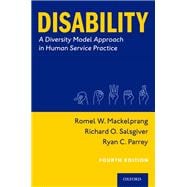Disability, Fourth Edition, is an indispensable tool for human services students in understanding disability from an empowerment perspective. The textbook is divided into three parts: Part I establishes a nontraditional context of disability, moving readers away from the perspective that people with disabilities are sick, passive, and deviant. Part II looks at groupings of disabilities placed within the context of the social definition of disability. Part III discusses human service practice with people with disabilities.
Authors Mackelprang, Salsgiver, and Parrey establish the historical and societal context in which those living with disabilities are marginalized while offering a social ecological model and its three--biosocial, psychosocial, and social--cultural dimensions that students and instructors can employ. Readers will also be introduced to universal diversity theory, which draws from feminist, race, disability, and queer theories for an approach that is applicable across all diverse groups. Written from a North American perspective, the book also addresses disability laws, policies, and practices globally. Learning objectives guide students' reading and discussion questions highlight key ideas while text boxes and personal narratives bring the book to life.








